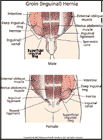
Groin (Inguinal) Hernia
What is a groin (inguinal) hernia?
The internal organs are held in place by wide band of muscle that extends from the groin (the area joining the leg and the body) to the ribs. Because of a sudden strain, the muscle may separate at a weak point. Then an organ, most often the bowel but sometimes the bladder or an ovary, can squeeze through the gap in the muscles, creating a bulge. This bulge is referred to as a groin (or inguinal) hernia.
A complication of a groin hernia is that after the bowel has pushed through the muscle wall, its contents may become trapped. A further, more dangerous complication is that the blood supply to the bowel may be cut off or strangulated and the tissue may die, resulting in gangrene. This is a medical emergency. Surgery is often necessary to correct the hernia.
How does it occur?
Some people, especially men, are born with a weakness in their groin muscles. With or without this weakness, a hernia may be caused by any factor that increases pressure in the abdomen, such as the following:
- lifting heavy objects
- coughing or sneezing a lot
- being constipated and straining for a bowel movement
- being obese
- being pregnant
- in men, pushing too hard to urinate when there is a blockage caused by an enlarged prostate.
What are the symptoms?
Symptoms associated with a groin hernia may include:
- pain or discomfort in lower abdominal or groin area
- a bulge that can be pushed back in
- a bulge that cannot be pushed back in; a potentially life-threatening problem because the bowel (or other organ) may be trapped or strangulated.
How is it diagnosed?
To diagnose a groin hernia, your health care provider will take your medical history, review your symptoms, and examine you.
How is it treated?
If the hernia bulge can be pushed back in and causes you few symptoms, you may not need surgery. Otherwise, treatment for a groin hernia is elective surgery. Your health care provider will usually suggest that you have the operation as soon as possible to avoid complications.
The surgery is done under local or general anesthesia. During the operation, the doctor will make a cut in the lower side of your abdomen. He or she will push your intestine back into the abdominal cavity and bring other tissue around the hernia to help cover the opening (the hernial defect). If there is not enough strong tissue available around the hernia, the doctor may place a mesh over the weak spot in the abdominal wall. The doctor may make the opening between the abdominal wall and the groin, called the inguinal canal, smaller to try to prevent another hernia. Some doctors do hernia repair with a laparoscope, an instrument that requires only small incisions to perform the operation.
Your health care provider will decide whether you can go home the day of the operation or should stay in the hospital for 1 or more days.
Your follow-up after treatment will depend on the severity of your symptoms and your related condition. If symptoms continue or if you develop new symptoms, tell your health care provider immediately.
How long will the effects last?
The effects will last as long as you have the hernia.
How can I take care of myself?
Follow these guidelines:
- Follow your health care provider's instructions.
- Follow your provider's advice for losing weight if you are overweight.
- Be careful when you lift, pull, or push heavy objects.
- Take medication to reduce allergies and sneezing.
- Avoid constipation by eating foods that are high in fiber, using stool softeners, or drinking a natural stimulant beverage such as prune juice.
- Use laxatives or enemas only if recommended by your health care provider.
- Ask your provider if you need to wear a groin support.
How can I help prevent a groin hernia?
Follow these guidelines:
- Learn to lift, push, or pull heavy objects the correct way.
- Adjust your occupational duties or recreational activities if necessary.
- Follow your provider's advice for a nutritious, safe diet to lose weight if you are overweight.
- Avoid constipation.
- Avoid smoking to help prevent coughing.

